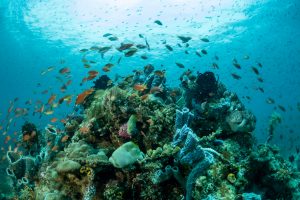
Isolated communities in the coastal tropics often have very limited access to healthcare. Poor health can restrict the ability of communities to engage in marine conservation and fisheries management. In response to this challenge, we collaborate with local and international health partners to increase access to quality health services.
In Madagascar, our community health programme is known as Safidy, which means “choice” and reflects our commitment to enabling communities to choose healthier behaviours and our commitment to advancing reproductive rights. Launched in 2007, it now serves more than 120,000 people across five priority conservation regions along the country’s west coast. In order to ensure the long-term sustainability of these improvements in health care, we work with partners to strengthen the health system within which Safidy sits.
We train and support a network of 100 community health workers to provide maternal and child health care, sexual and reproductive health services and safe water initiatives. We also strengthen the work of community based government health facilities, so that they can oversee and support these community health workers. We work closely with specialist and government partners to strengthen other levels of the public health system and ensure sustainable long-term improvements in healthcare.
In Mozambique, Kenya, India, Indonesia and Peru, our health technicians support our marine conservation partners to assess the unmet health needs of coastal communities and identify appropriate health agencies with whom they can collaborate to address these needs. As well as ensuring some of the world’s hardest to reach communities enjoy better access to healthcare, they are also better able to engage in marine conservation and fisheries management.
We facilitate diverse peer-led community outreach activities that encourage critical thinking about health-related behaviours and help to empower community members to make healthier life choices. Interactive theatre workshops, storytelling sessions and small group discussions engage men, women and young people in topics ranging from maternal health to women’s roles in seaweed farming and fisheries management.
Our approach encourages broad community participation, for example, opening up discussions about family planning with men by relating food security concerns to reproductive rights.
Improvements in community health have transformed the lives of fishers and their families.
The proportion of women using contraceptives in the Velondriake locally managed marine area in southwestern Madagascar increased from 10% in 2007 to 59% in the first six years after the programme was established, with a halving in the general fertility rate and a sixfold increase in the duration of exclusive breastfeeding over the same time period.
Women who are accessing our family planning services are earning more than twice as much money as those who are not using the service, and report demonstrate having longer- term priorities.
As a result of improved health and wellbeing, community members also report a greater sense of empowerment, being better able to work more, provide for their children better and look after their families.
Integrating health services into our marine conservation activities has enabled communities to better respond to climate related shocks and stressors, and has enabled us to better navigate the COVID-19 pandemic.
“Safidy is important for me because it stopped me from getting pregnant. So, I can do work because I have time. I have been able to choose how many children I have… I can get money to help my family. When I have more money I can save a little bit for the future.”
Recognising the value of addressing community needs in a holistic way, we have supported the establishment of a national health-environment network in Madagascar, bringing together health and environmental organisations to facilitate cross-sector partnerships. The network team offers technical advice and mentoring to conservation organisations embarking on collaborative initiatives with health agencies. They host learning exchanges and training workshops, convene regional and national meetings to share experiences, produce technical resources, support organisations to track their impact and work with the Government of Madagascar to create an enabling policy environment for health-environment programming.